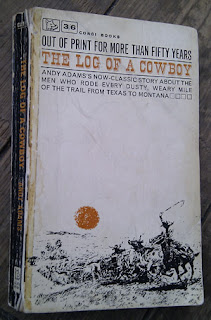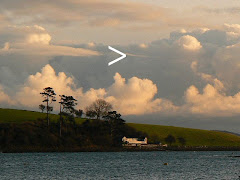Andy Adams
As the American West has been a lifelong interest, I have a pretty good library on the subject: fiction, non-fiction and - the West being where myth and reality meet, mix and quite often marry - somewhere in between.
Now and then I have a flick through Russell or Remington, pluck Westernisms at random from Winfred Blevins, or dip into my favourite Western author, Will James (who epitomises, incidentally, the fiction/non-fiction collision). The problem is that the frontier fascinated contemporary writers as much as it fascinates us - some of us - and quite often these writers were firmly of the East: Owen Wister, author of The Virginian and regarded as the father of the western genre, spent a few summers in Wyoming but lived in Philadelphia and Rhode Island; James Fenimore Cooper (The Last of the Mohicans)was born in New Jersey, lived for many years in Europe and died in New York, never having visited the west about which he wrote so vividly.
For a true-to-life depiction of the West, no-one beats Andy Adams. Adams was born on a farm in Indiana in 1859, to pioneer parents. He worked the farm through his teens and early twenties, and then spent ten years driving cattle in Texas, working the Chisholm and Great Western cattle trails as a seasonal hand. In his forties, he followed the gold rush to Colorado and Nevada, and in the same period took up writing. His most famous book, of which I own a dog-eared copy from the 1962 Corgi imprint, was called, prosaically enough, The Log Of A Cowboy, and tells the story of a five-month cattle drive along the Great Western Trail from Texas to Montana. For Western aficionados, it's a riveting read. Obviously, he knew his stuff, but for me it was his love of horses that resonated more than anything. This is a passage from the last chapter, when they reached the railhead in Montana and had to sell their mounts:-
"..at no time in my life, before or since, have I felt so keenly the parting between man and horse as I did that September evening in Montana. On the trail an affection springs up between a man and his mount which is almost human. Every privation which he endures, his horse endures with him.."
The interesting thing is that the whole account is fiction - Adams never claimed otherwise - but as an historical record of the day-to-day details, dramas and drudgery of a cattle drive, it's considered by historians to be as close as you're going to get.
















